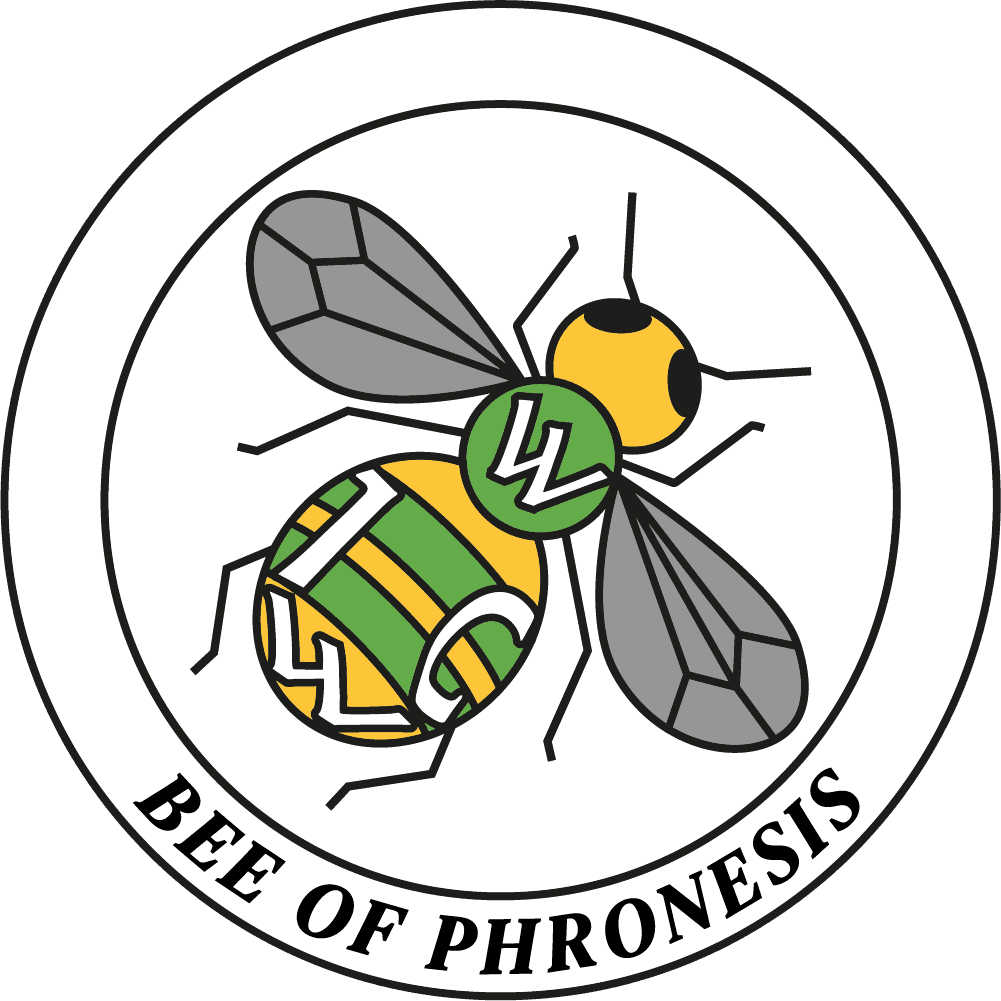The Bee of Phronesis symbolizes practical wisdom in UTOK, representing the integration of knowledge into ethical, real-world action. It reflects the pursuit of growth through wise, thoughtful decisions grounded in both character and well-being.
Introduction
The Bee of Phronesis is one of the two Wisdom Bees in the UTOK Garden, complementing the Bee of Sophia. While Sophia is concerned with the cultivation of deep knowledge, Phronesis focuses on the application of that knowledge in everyday life. It is the embodiment of phronesis, an Aristotelian term referring to practical wisdom—knowing how to act rightly in specific situations to promote flourishing and well-being. The Bee of Phronesis ensures that knowledge does not remain theoretical but becomes a guide for effective and ethical action in the world.
The Role of Phronesis in the UTOK Garden
The UTOK Garden represents the framework where subjective, objective, and intersubjective knowledge systems are harmonized. In this ecosystem, the Wisdom Bees—Sophia and Phronesis—work dialectically to pollinate the UTOK Tree of Life with knowledge and wisdom. The Tree of Life houses the eight core ideas of UTOK, divided into two branches: the Unified Theory of Psychology and the Unified Approach to Psychotherapy.
Phronesis, aligned with the Unified Approach to Psychotherapy, is concerned with practical application—taking the insights gained from the Unified Theory and translating them into action that improves well-being and fosters ethical behavior. It promotes wisdom in action, emphasizing the need to not only understand but to embody wise living in one’s daily experiences and decisions. This is essential in cultivating character and achieving valued states of being.
The WIC-W Bee: Wisdom, Interest, Character, and Well-Being
The Bee of Phronesis is formally known as the WIC-W Bee, which stands for Wisdom, Interest, Character, and Well-Being. Each of these core elements integrates insights from the branches of UTOK’s Tree of Life and represents the path toward practical wisdom:
Wisdom: Drawn from the Tree of Knowledge (ToK) System and Justification Systems Theory (JUST), wisdom is the outcome of unified, coherent knowledge that is justified to maximize valued states. It involves knowing not just what is true but what ought to be done in particular circumstances.
Interest: Rooted in Behavioral Investment Theory (BIT) and the Influence Matrix, interest represents the alignment of individual actions and investments with social and environmental dynamics. It frames the interaction between personal motivations and social influence, ensuring that one's actions are contextually grounded.
Character: Informed by Character Adaptation Systems Theory (CAST) and the Wheel of Development, character represents the adaptive development of good moral habits. It emphasizes resilience and ethical behavior, guiding individuals to grow in the face of life's challenges.
Well-Being: This is derived from the Nested Model of Well-Being and CALM-MO. Well-being, or "Well-Beeing" as the WIC-W Bee symbolizes, is the ultimate goal, achieved through mindful adaptation, emotional attunement, and the cultivation of valued states of being.
Phronesis: Wisdom in Action
Unlike the more reflective, theoretical knowledge represented by the Bee of Sophia, Phronesis is about practical wisdom—knowing how to act, when to act, and why to act in specific contexts. It is not merely about understanding principles but about integrating them into action that promotes well-being and wise living.
The Bee of Phronesis helps individuals and communities embody wisdom in their daily actions, fostering ethical behavior, personal growth, and collective well-being. In psychotherapy, Phronesis directs the application of scientific knowledge toward real-world healing and adaptation, focusing on improving mental health and fostering personal transformation.
Symbolism in the UTOK Garden
In the UTOK Garden, the Wisdom Bees perform a dialectical “waggle dance,” much like honeybees communicating the direction of precious resources. This dance symbolizes the cross-pollination between theory and practice, science and humanism, and knowledge and application. The Bee of Phronesis, in this metaphor, guides individuals toward ethical action in the pursuit of wisdom, while Sophia gathers and deepens knowledge.
Phronesis’ role is crucial in balancing the knowledge systems of UTOK. While Sophia informs us about what is known, Phronesis ensures that this knowledge leads to wise action, fostering growth and well-being across generations. Together, the two bees represent a continuous feedback loop of learning, application, and adaptation.
Wisdom, Suffering, and Adaptation
A critical part of the Bee of Phronesis’ mission is guiding individuals through the inevitable suffering and adversity that life presents. By applying wisdom to real-life situations, Phronesis helps individuals navigate suffering not by avoiding it but by responding to it with adaptive actions that lead to growth and healing.
This is particularly relevant in psychotherapy, where the practical wisdom of Phronesis helps clients transform neurotic suffering into a source of insight and development. UTOK’s approach to psychological mindfulness, exemplified by CALM-MO, aligns with Phronesis’ guidance. The WIC-W Bee supports individuals in maintaining emotional attunement, fostering curiosity, acceptance, and compassion in the face of adversity, ultimately leading to a state of well-being.





